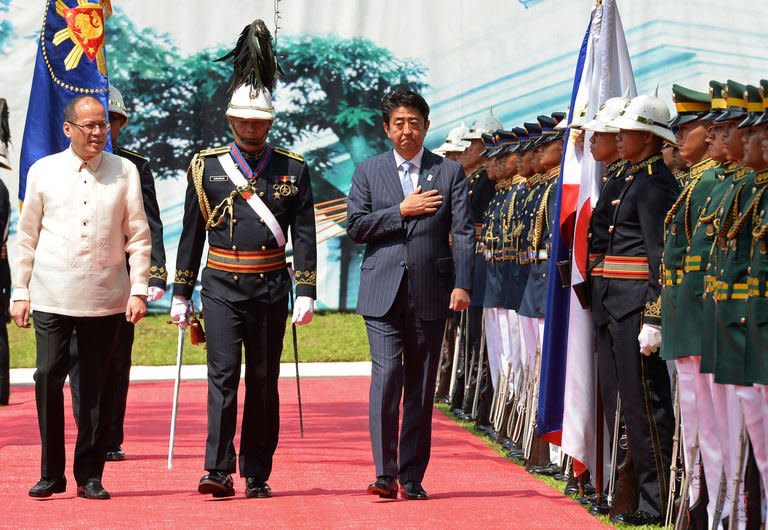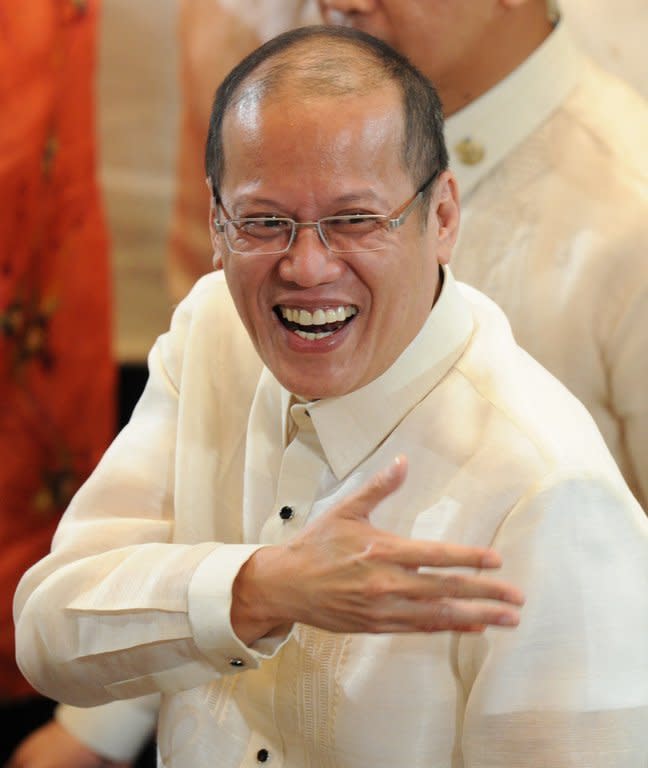Japan PM vows to help Philippines amid China row
Japan's Prime Minister Shinzo Abe pledged to strengthen the Philippines' maritime defence capabilities on Saturday, while reassuring neighbours about Tokyo's intentions amid growing territorial disputes with regional rival China. "For Japan, the Philippines is a strategic partner with whom we share fundamental values and many strategic interests," Abe told a joint news conference with Philippine president Benigno Aquino after their meeting in Manila. Speaking through an interpreter, Abe said his visit was intended "to strengthen the relations with the Philippines in all areas", including politics, security, and the economy. As part of Japan's commitment, Abe said there would be "continued assistance to the capacity-building of the Philippine coastguard". As an example of this, he cited 10 patrol boats that Japan is providing to the poorly-equipped Philippine coast guard. The Filipino coastguard and navy have been at the forefront of tense encounters with navy and maritime surveillance vessels from China, which claims most of the South China Sea including areas close to the Filipino coast. China seized the Scarborough Shoal, a South China Sea outcrop just 230 kilometres (140 miles) east of the main Philippine island of Luzon, last year after Manila backed down from a lengthy stand-off. This year the Philippines has complained about the presence of Chinese navy vessels near Filipino-held Second Thomas Shoal in the Spratly islands. Japan earlier this year announced it would make loans to the Philippines to purchase the 10 Japanese patrol vessels for its coastguard. "The Prime Minister and I agreed to strengthen maritime cooperation which is a pillar of our strategic partnership," Aquino said Saturday. Abe's visit came as tensions have also steadily risen between China and Japan over Japanese-controlled islands in the East China Sea. He reiterated a call for a leaders' summit with China to discuss their territorial dispute, and assured the rest of Asia that his vision for a more robust Japanese armed forces would not threaten the region's peace and security. Abe said Saturday his party's decisive victory in the upper house of the Japanese parliament would help him pursue his vision of Tokyo's role in the region, many parts of which were under brutal Japanese occupation in World War II. "Against this backdrop I intend to further proceed with strategic diplomacy which will contribute to regional and global peace and security," he said. Abe has pledged to loosen limits on the military in Japan's pacifist, post-war constitution and stand up to China over their East China Sea dispute. He acknowledged at a separate news conference, after he appeared with Aquino, that a more assertive Japanese military was a sensitive issue in the region. "I intend to explain politely so that the countries in the region will not have any misunderstanding," he said. Abe said problems with China were "inevitable" being neighbours, but stressed that peaceful coexistence between the two regional powers was crucial for Asian peace and prosperity. "It is important that we have frank and candid discussions. I have given instructions so that the foreign affairs authorities (can) proceed with dialogue without any conditions attached. Foreign ministers-level and leaders-level meetings should be promptly held." As Abe and Aquino met at the presidential palace, about 80 protesters including elderly ladies who said they were former comfort women staged a rally nearby, holding signs demanding reparations from Japan.




